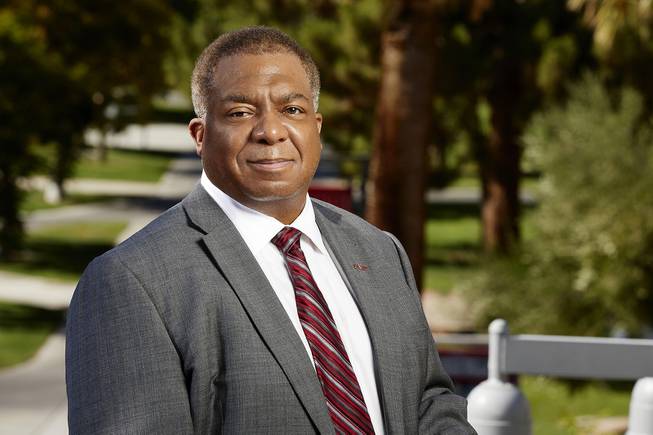
Josh Hawkins / UNLV Photo Services
UNLV President Keith Whitfield poses for a photo on campus Thursday, July 23, 2020. Whitfield is the 11th permanent president of UNLV.
Thursday, Jan. 28, 2021 | 5:19 p.m.
UNLV will place an extra emphasis on developing a culture of social justice, equity and inclusion during the upcoming year, said President Keith Whitfield, the first Black president in the school’s 64-year history.
“Bringing this focus to the forefront, and further defining expectations will create actionable items,” he said during a pre-recorded state-of-the-university address Thursday. “I know this new goal may generate some anxiety and maybe some skepticism, however, we need to realize our deficiencies and acknowledge that there is inherent structural racism at this university.”
Whitfield, who was hired last summer, said UNLV isn’t “unique in that regard” and that most organizations “have some element” of structural racism.
“In most cases, structural racism is unintentional,” Whitfield said. “Some might ask what this has to do with graduating students, but if we’re going to reach the next level, we need to realize and understand that this is a challenge that needs to be addressed at UNLV, too.”
Whitfield said the university will address “leadership accountability, unintentional biases in search committees,” and the implementation of new faculty and staff mentoring programs.
The theme of Whitfield’s 30-minute address centered on the idea that UNLV should “aim high” in the coming years as it continues to grow its reputation, brand and offerings.
Whitfield lauded steps his predecessors — and other university leaders — have taken in recent years to establish UNLV as a respected urban public research university. He noted its 2018 designation as a Carnegie R1 research institution.
“That bolstered the reputation and brand of UNLV,” Whitfield said. “As I say, we can make great better.”
Whitfield also said he’d like to see graduation rates improve.
In the coming years, his goal is for the school’s six-year graduation rate to improve to 60%, which would be a 16-point jump from where it stands today.
Part of that plan will include lowering the adviser-to-student ratio at UNLV from one adviser for every 515 students to one for every 350.
Not unlike other institutions of higher education, Whitfield noted that UNLV has struggled at times during what has been a “tumultuous” past year as the COVID-19 pandemic has caused major disruptions at colleges and universities throughout the country.
UNLV’s student enrollment for the fall 2020 semester — 31,142 — was only slightly under its enrollment figure for the fall 2019 semester. Undergraduate enrollment actually increased during that time, according to the university.
However, about 80% of its courses last fall were virtual, a percentage that is expected to remain similar for the spring semester, which began this month.
Whitfield noted that UNLV — partially because it’s stationed in a densely populated metro area — was in a better position than some other universities to weather a pandemic-induced drop in enrollment.
Whitfield also lauded various efforts by the UNLV Greenspun College of Urban Affairs in helping to address “the homeless issue and food insecurity” in Las Vegas.
In the coming years, Whitfield said economic development issues will have a “more front-and-center role” at UNLV, which will likely include a strengthening of what he referred to as “industry engagement” and advancing entrepreneurship and innovation.
“Strong universities are vital to the economic recovery, development and sustainability of Southern Nevada,” Whitfield said.
